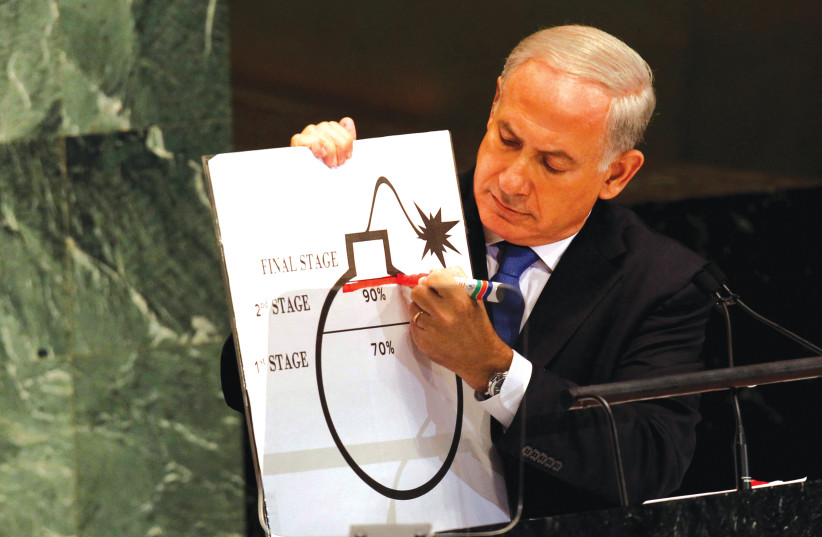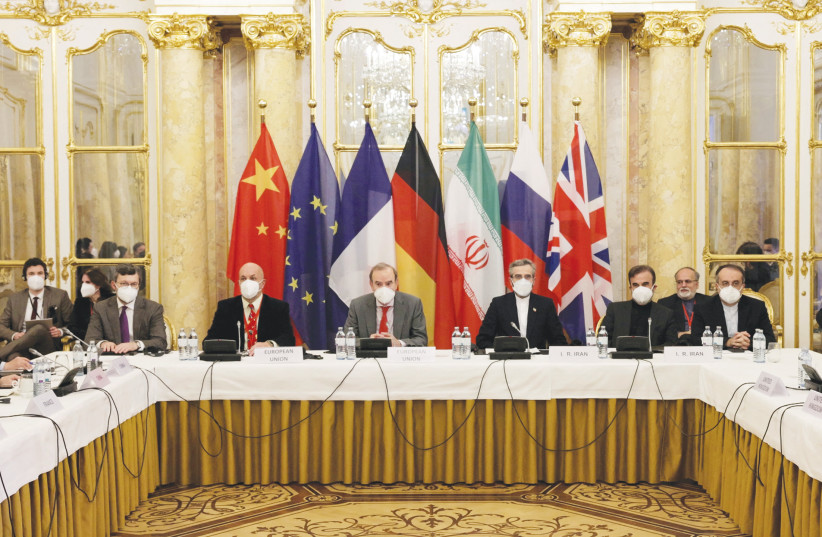Even if Iran wants to destroy Israel, this does not mean it would be prepared to pay any price to do so.

There is no doubting the existence of an objective Iranian threat to Israeli security, but how severe that threat is and what risks Israel should take in dealing with it are issues that are more complex than meets the eye. Iran is marching toward nuclear weapons, although Israel reserves the option of striking Tehran’s nuclear program.
Nuclear weapons are not new, and obtaining them is far from impossible for a regional power like Iran. Public vows by Israeli defense officials that Iran will “never” get nuclear weapons are irresponsible.
Yes, Israel should and will try very hard to prevent Iran from going nuclear. But the Iranian nuclear program is unlike the Iraqi and Syrian programs. These were focused on single sites that were attacked and destroyed by the Israeli Air Force. After studying Israel’s modus operandi for years, the Iranians spread out their nuclear sites and dug them deep underground.
In addition, Iran’s nuclear knowledge is based on local capabilities. In light of the fact that Iran is a developed nation, with highly educated scientists, mathematicians, and engineers, killing some members of its nuclear weapons group will only result in their substitution with others. It is not possible to assassinate knowledge once a country has obtained it.
A more important question is why Iran wants nuclear weapons in the first place. Why is possessing this 20th-century weapon so important for Tehran? Addressing this question is an intelligence challenge that goes beyond modern data processing systems and artificial intelligence tools that some in the intelligence community are so infatuated with today. It is a question that is also tied to another key question: Is it inevitable that Iran will always be our biggest enemy?

Such strategic intelligence is vital for knowing which general direction to take. Israel’s founder, David Ben-Gurion, relied on human intelligence sources to figure out the intentions of Egypt, Jordan, and Syria before the 1948 War of Independence, and this is the definition of strategic intelligence – the type of knowledge we now need on Iran.
Even if Iran wants to destroy Israel, this does not mean it would be prepared to pay any price to do so. It is not clear that Iran is prepared to destroy itself in order to destroy Israel. Yet when Israelis think about the Iranian threat, existential threats immediately surface, and Holocaust associations rise from the collective subconscious.
This is too simplistic. Israel cannot manage its defense policy based on deterministic concepts about its enemies. Iran is not a monolithic country, and ongoing power struggles between the conservative camp and the reformists are a fixture of political life in that country.
Holocaust traumas do not make sound policy guides for a sovereign nation. The year is not 1942 when Jews could not retaliate or exact prices. Former prime minister Benjamin Netanyahu’s flagship messaging to Israelis was that he would not allow an ‘Auschwitz 2.0’ in the form of a nuclear Iran. But the security of a state cannot be based on panic.
It was easy for Netanyahu to unite the people behind the need to fight this threat, which is uncontroversial and is not subject to the ideological divisions that plague Israeli society.
Netanyahu presented the issue in ‘no choice war’ terms and was able to get the people behind him. He was able to achieve this unity on Iran in ways that he could not do on other fateful, ideological questions closer to home, such as guaranteeing that Jerusalem would never be divided.
This is because ideological positions have lost their legitimacy – yet fighting against a nuclear Iran is not an ideological position, it is purely a security matter. As a result, Netanyahu was far more vocal on Iran than on issues such as defending Israel’s rights in Area C of Judea and Samaria, or when an Arab uprising over Jerusalem erupted within the State of Israel in May 2021.
In addition, a commitment to stopping Iran’s nuclear program at all costs increases Israel’s dependence on the United States, since any objective analysis cannot avoid the conclusion that Israel needs the US to deal with Iran.
Israel alone cannot fight a war against the Iranians, and this means Israel enslaving its other interests to American directives in many areas. This is particularly true of Israeli policy in Judea and Samaria. The fact that Israel is in fact doing this is already a major achievement for Iran.
From a physical perspective, the nuclear weapon involves launching the weapon and its detonation upon impact, but from a wider strategic-holistic perspective, the Iranian nuclear project has already for years been generating a highly significant process that requires recognition. This process has led Israeli policy to focus its resources and attention on the Iranian bomb, to make its interests subservient to American interests, and to act with containment and restraint in other arenas, while giving up on active operative initiatives. This represents an unprecedented achievement for the Iranian bomb – an achievement that has been entirely overlooked in Israel and one that has not been taken into consideration in the map of policy calculations.
Furthermore, the level of preparations that the Israeli defense establishment must undertake to prepare for a strike on Iran harms the ability of the IDF Ground Forces to prepare for other closer threats in Israel’s environment by taking resources away from those preparations.
Ultimately, Israel must be prepared for the Iranian threat, and it must reserve the option of attacking. But it cannot completely devote itself to this threat at the expense of all other interests and preparations for other threats that it faces.
The writer is a retired IDF Maj. Gen. and a publishing expert at The Miryam Institute. In 2005, he oversaw Israel’s disengagement from the Gaza Strip.
Content retrieved from: https://www.jpost.com/opinion/article-694653.